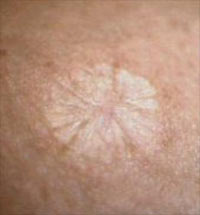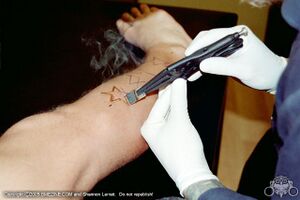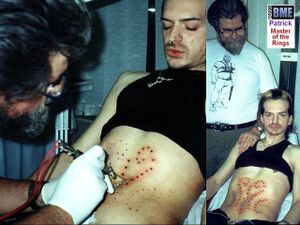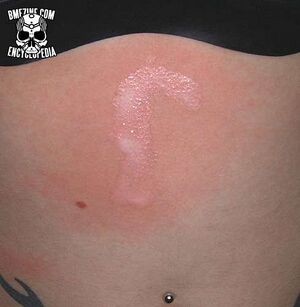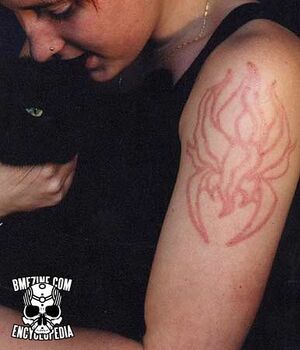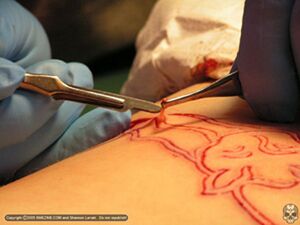Scarification
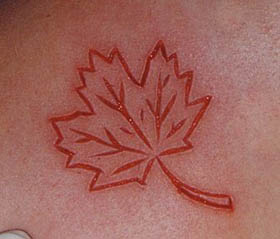
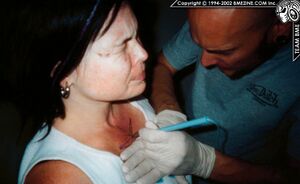
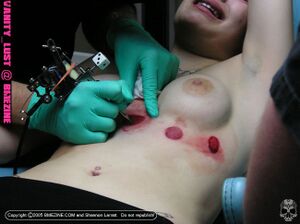
Scarification is the creative and artistic application of scars in a controlled manner to achieve an aesthetically or spiritually pleasing result. Scarification is considered to be different than Self-Harm, in the body modification community because it is mainly for cosmetic purposes rather than a way to cope with undue stress.
Many people that do these forms of body modification are doing it to mark a rite of passage in their lives. Even though many people hold that scarification is no more painful than tattooing, it is somehow more "intense" to most people. It has very symbolic meaning to them and often their peers or partners.
Typically the goal of scarification is to get raised scarring, preferably Keloids, but most people usually heal to Hypertrophic Scarring. Because scarification has a three dimensional aspect, many people enjoy the feeling of healed scars. As a rule of thumb, darker skin tones usually have better scarring than lighter skin tones.
Contents
- Types of Scarification
- Artists
- Self-Scarification
- History and Culture
- Legality
- Related Risks
- See also
- External Links
Types of Scarification
- Branding
- Cutting
- Chemical Scarification
- Dremel Scarification
- Injection Scarification
- Tattoo Gun Scarification
- Skin Removal
- Ash Rubbing
Artists
While you can see a list of scarification artists at Category:Scarification Artists, the easiest way to find scarification artists local to you is an Internet search, coupled with visiting the better piercing and tattoo studios in your area, since almost every (but not EVERY) scarification artist working in the Western world is also a body piercer. To know whether an artist is qualified, ask to see a portfolio. If the portfolio does not contain many well-healed pieces, then you have no way of telling what the artist's work turns out like. It's not hard to make a scarification piece look good right after it's done—it's far more important how it heals. Additionally, if you can, read any experiences about the artist on BME, and talk to their other customers.
The cost of a scarification varies greatly. Some artists don't charge at all, and others charge a great deal. This variation is not linked to the quality of work. In general, a scarification of a given size will cost about the same as a tattoo of about the same size.
Self-Scarification
Self-scarification, while common, is not recommended. It is the best way to get a low quality scar.
Most artists are self trained, but this is not the most responsible option, especially nowadays. The best way to become a scarification artist is by apprenticing under an experienced practitioner. As far as how to achieve that, get to know one on a personal level and take it from there.
In addition, it is important that young people reading this realize that under no circumstances should scarification be considered as a "career", the commercial market is just not large enough.
Fakir Musafar[1] offers group training in traditional scarification techniques, and has recently added some modern cauterizing techniques as well.
History and Culture
Scarification can be found in almost every tribal culture.
Up until quite recently, in modern western body art, most of this was done in an S&M environment. However, now that the vast majority of people interested in body modification have had little to no contact with the S&M community, that has changed, and many people are getting these types of modifications for purely aesthetic reasons.
Legality
Laws vary from place to place, and advanced methods of scarification (chemical branding, etc.) as well as methods using modern tools (such as medical electronic cauterizing devices) may not be fully legal.
Scarification such as cutting and branding which has an established history is legal when performed in a consensual context in most jurisdictions.
Related Risks
By far, the largest risk is the aesthetic one. Branding, cutting, and scarification are far from precise arts, and because the call for scarification is much smaller than that for piercing or tattooing, most artists are simply not that experienced. In addition, even experienced artists have trouble getting consistent results because there are so many variables in the healing process. To compensate, many artists feel it's responsible to stick to relatively simple geometric designs, rather than more intricate patterns.
Additionally, there are risks of infection, as with all body art, but this is minimized with proper wound care. Also, improper technique (for example cutting or branding to deep) can be extremely dangerous, so be sure your artist knows what they are doing.
Finally, on the aesthetic risk: it's not the artist that creates the scar, it's your body. Everybody scars differently, so a technique that works great on one person may look horrible on another.
See also
External Links
'
